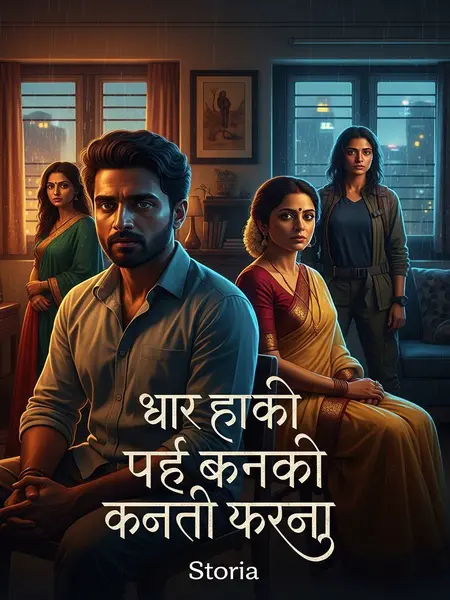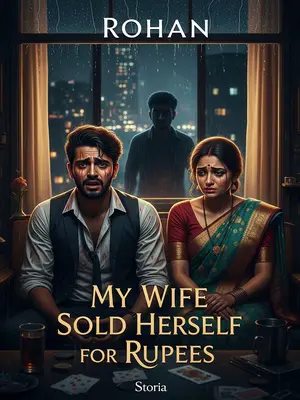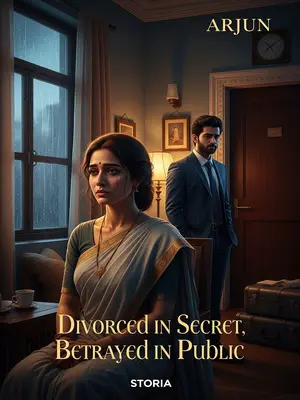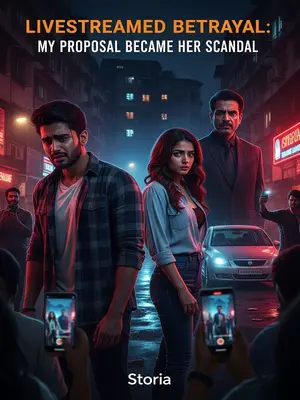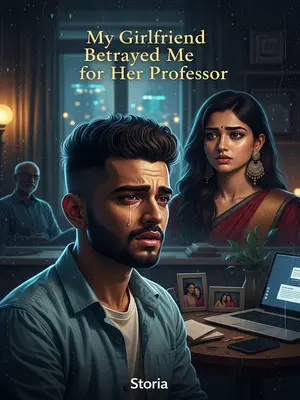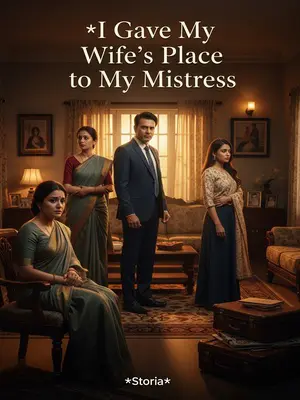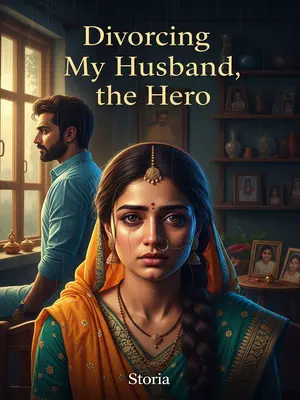Chapter 2: Lost and Found in the Jungle
2
The campsite was silent, the moon and stars casting a cold, silvery light.
The only sounds were my own nervous footsteps on the grass and the distant, rhythmic chirp of crickets. Somewhere in the night, a langur called to its mate, and a chilly wind sent goosebumps up my bare arms.
Guided by the moon, I walked behind the tents. Sure enough, just a few steps away was a gentle slope; she was half-lying on the ground, a night lamp beside her, gazing at the distant sky.
Her silhouette looked ethereal in the soft glow. The lamp cast golden shadows across her face, highlighting the curve of her cheek, the softness of her hair. I almost felt like an intruder in a painting.
The scene was breathtaking.
For a second, I just stood there, watching her. She looked so peaceful, lost in the stars, as if she’d never known city chaos or heartbreak.
I looked back—the slope blocked the view from the campsite and was far enough away.
Still, I felt a pang of guilt. This kind of hidden place—half daring, half dreamlike—it was perfect and dangerous all at once.
I didn’t know why I was doing this, as if I’d done it many times before.
The oddest thing—my body moved on its own, ignoring the voice in my head that whispered about consequences, about what people would say if they found out.
I walked towards her, and only when I got close did I notice that a few metres ahead was a cliff. I could faintly hear water flowing below.
My foot slipped a little on the loose stones, and suddenly the realness of the moment hit me—the sheer drop, the night air, the smell of damp earth and grass.
“It’s so beautiful. I’ve never seen a sky like this,” she murmured, leaning into my arms as soon as I sat down.
Her body was warm against mine. I could feel her heart racing—or was it mine?
All my reservations melted away. I gently put my arm around her shoulders, my hand naturally falling to her chest.
Her skin was cool, goosebumps rising under my palm. The moonlight caught on her hair, turning it silver at the ends. My senses felt sharper than ever—every sound, every scent, magnified.
We were like lovers deeply in love, whispering simple words as our bodies intertwined without restraint. The mountain night wind seemed to carry a strong scent of hormones, stirring up the desires in both our hearts.
It was like being swept away by the monsoon—the kind of desire that refuses to be contained. I could taste the salt of her skin, feel the earth’s heartbeat beneath us. For that moment, nothing else existed.
The moment our lips touched, I made up my mind—who cares about love or marriage? Life is short. Why not indulge, just this once?
There’s a saying, na—zindagi na milegi dobara. For the first time, I understood what it meant. We were two strangers, both running from something, both seeking refuge in each other.
With the starry sky as our blanket and the earth as our bed, we burned with passion, making love right there.
The wind picked up, the air heavy with the smell of wildflowers and damp soil. The stars watched silently as we lost ourselves in each other.
She was uninhibited.
Her hands gripped my back, her laughter muffled by my shoulder. There was no fear, no shame—just raw need, honest and urgent.
At the height of passion, she flailed her arms and legs, unable to stop. I let go of my fear of being discovered and unleashed my wildness.
For once, I didn’t care about the world—about my wife, about society, about tomorrow. There was only now.
Afterwards, we lay side by side, feeling the mountain breeze pass through the spaces between our bodies.
The grass prickled against my skin. She shivered, and I draped my jacket over her. For a moment, we were silent, just listening to the water trickling far below.
“Maybe I’ll only come here once in my life. I have no regrets now,” she said softly.
Her voice was barely audible, but I could hear the truth in it. Maybe this was her escape, too.
I gave a wry smile. “Don’t get sentimental yet—I have some bad news for you.”
I tried to keep my tone light, but my heart thudded with nervousness. She turned her head, her eyes wide with sudden worry.
She looked alarmed and glanced around. “Don’t scare me.”
She clutched my arm tighter, her body tensing as if bracing for the worst.
I pointed to the cliff. “You got so excited just now that you threw your phone off.”
For a second, she stared at me in disbelief. Then the panic set in, her mouth forming a perfect O as she gasped.
“Arrey!” She jumped up and rushed towards the cliff. I grabbed her and pulled her back into my arms.
She struggled for a moment, then laughed breathlessly. “Pagal ho kya? I can’t lose my phone!” Her accent was city-slick, but her panic pure desi.
“Too dangerous. Let’s wait until morning to look for it. But don’t get your hopes up—even if we find it, it’s probably broken.”
I brushed a stray hair from her face, trying to sound practical. In the city, a lost phone is a crisis; in the mountains, it’s just another story.
She looked at me, disappointed, and shrugged helplessly.
She sank back onto the grass, sighing. For a moment, she seemed younger, vulnerable.
“Without my phone, I’m in trouble.”
She pressed her lips together, worry creasing her forehead. “My dad will call, my office will call, and if I don’t pick up, it’ll be full-on drama!”
“No phone, but you still have me, don’t you?”
I tried to lighten the mood, nudging her shoulder. She shot me a look, half amused, half annoyed.
She got dressed and stood up, giving me a look, her attitude suddenly turning cold.
A wall went up between us, as if the magic of the night had evaporated with the dew. She zipped her jacket, and her face set in a mask of indifference.
“It was just for fun. You don’t need to take responsibility.”
Her words were sharp, but I could see the flicker of doubt in her eyes. Maybe she was protecting herself—or maybe protecting me.
3
In the morning, the leader woke everyone and told us that today’s route wasn’t long—we could take it slow and enjoy the scenery.
A line formed at the lone water tap, everyone brushing teeth with cold water and muttering about missing home bathrooms. The sun crept over the peaks, bathing everything in golden light. As we sipped chai from dented steel tumblers, the leader’s voice—always a bit impatient—announced the plan. Everyone relaxed, already planning extra selfies and snack breaks.
She raised her hand timidly and said she’d dropped her phone off the cliff last night while going to the bathroom, and wanted to go down the mountain to look for it.
Her excuse was classic—so obviously a cover that even the guide had to suppress a smile. Still, in India, you never question a woman about bathroom business, so everyone nodded sympathetically.
Such last-minute changes always annoyed the leader; sure enough, as soon as she finished, he frowned.
He muttered something about the trek schedule under his breath. Leaders on these trips always act like they’re shepherding naughty schoolchildren, as if one wrong step will ruin everyone’s future.
Fortunately, the local guide said it wasn’t hard to go down—there was just a small stream at the bottom of the cliff. Even if the phone wasn’t smashed, it might have been washed away, so the chances of finding it weren’t high. But he was willing to lead the way, and the others could continue on with the leader. We could meet up at the next village.
The guide’s attitude was relaxed—maybe he enjoyed a little drama to break the monotony. “Bas, don’t worry,” he said, “I’ll show you a shortcut also.”
When I heard this, I quickly volunteered to go with the guide—three people would be safer.
I tried to sound casual, but my eagerness probably gave me away. A few of the others exchanged knowing glances, but no one said anything.
The leader agreed, so our group of eight split into two teams: the local guide took her and me down behind the cliff, while the leader led the others along the original route.
Bags were shuffled, snacks traded, and we set off—her with her cap pulled low, me pretending not to care, the guide whistling a folk tune.
She glanced at me, her expression neither grateful nor resentful—just complicated.
It was that classic Indian look: a mix of pride, shyness, and a hint of challenge, as if daring me to read her mind.
But her face and figure were truly remarkable. In this wilderness, she seemed as ethereal as a fairy.
Even the birds seemed to hush when she passed. I caught the guide staring once or twice—she was the kind of woman who leaves an impression, even in a crowd.
As we descended, the guide told us stories about the area, and time passed quickly. The sound of the stream grew louder, and soon we reached the bottom of the cliff.
He pointed out trees with ghost stories attached, described tigers that once roamed here, told us about ancient Adivasi rituals—his voice made the trek feel less dangerous, more like an adventure.
Unexpectedly, the phone we thought we’d never find was lying right in front of us.
It glimmered in the sunlight, half-buried among the pebbles, as if mocking our night-time drama.
The body was bent, the screen shattered, soaked in water, wedged between pebbles.
Bits of glass glinted like diamonds. She knelt down, running her fingers over the cracked surface, her face tight with disappointment.
Luckily, the stream was crystal clear, so the phone stood out, submerged in the water.
The water was icy, making our hands numb as we fished it out. The guide muttered a quick prayer to the river goddess—just in case.
I picked up the phone and handed it to her; she pressed the buttons over and over, but there was no response.
She kept pressing the power button, hope flickering in her eyes, but the black screen stared back.
“Take it as a memento—at least the trip wasn’t wasted,” the guide said, a little regretfully. “We can follow the stream to the next village—actually, that’s another trekking route, just not safe in the monsoon. You might as well experience the hidden path.”
The guide grinned, clearly pleased at the chance to play explorer. “Monsoon mein toh risky hai, but today, no problem. You’ll see some real jungle now!”
She put the phone in her backpack, looked at me, and said, “Don’t lose me.”
Her voice was soft, almost pleading, as if she was saying more than just the words.
To be honest, at that moment, I really felt she meant something more.
For a second, I imagined taking her hand, pulling her close, promising to keep her safe. But old habits die hard; I kept my feelings to myself.
But I didn’t dare think about it, nor did I dare meet her eyes.
The guilt of last night hovered between us, heavy as the humidity. I kept my gaze on the path, pretending to admire the wild ferns.
I have a wife; we’ve been married five years.
The truth slammed into me, cold as river water. My whole life—my old flat, my wife’s WhatsApp calls, the pressure cooker whistling at home—all of it suddenly felt very far away, yet unbearably close.
My heart thudded—would anyone guess what really happened last night?
---
[End of Chapter 2: What we left behind in the jungle would follow us home.]
